The Bayou Ballot Box
Air Date: Week of August 27, 2010
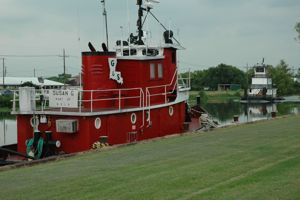
(Photo: Mitra Taj)
The third congressional district of Louisiana stretches over most of the state's coastline. Storm protection, the role of the offshore oil industry, and the rapidly-disappearing coastline are bread and butter topics for voters there, and host Steve Curwood checks in with the volunteers of political campaigns to understand how the district's problems are turning into hope at the bayou ballot box.
Transcript
YOUNG: It’s Living on Earth – I’m Jeff Young.
CURWOOD: And I’m Steve Curwood, down in the bayous of Louisiana.
[SOUND OF CICADAS SINGING IN TREES, DOGS BARKING IN BACKGROUND]
CURWOOD: When you go down the Bayous from New Orleans towards the ocean, you head into Louisiana’s third congressional district. And this year as candidates vie for an open congressional seat in Bayou country, we asked some active citizens how they want their elected officials to serve them in these perilous times of storms, oil spills and coastal erosion. We begin at Ellender Farm, a 3200-acre sugar plantation.
[ELLENDER OUT BACK: You can hear the wind in the cane. See how tall it is? That’s ready to harvest. Hey, Yvonne!]
CURWOOD: Theresa-Marie Ellender walks past her neighbor’s house and toward fields of tall, green stalks of sugar cane. Her husband’s family has owned and farmed much of this land for more than 150 years. Her house faces Highway-55 in the small town of Bourg in a parish called Terrebonne, which is Cajun French for “good earth” or “good land.”
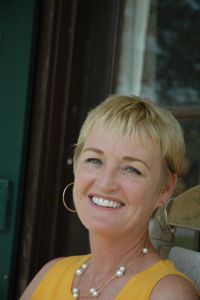
Theresa Marie Ellender is campaigning for a conservative candidate in the GOP primary. (Photo: Steve Curwood)
ELLENDER: They used take…to have donkeys and a barge and they would pull the barge. Down at Montague they used to have a sugar mill. And they would load up the barge full of sugarcane and follow the bayou all the way down to the mill. And so that’s why the road is here and follows the bayou and why it’s so close to the bayou.
CURWOOD: Passing cars and trucks would find it hard to miss the big sign planted in front of her house: Jeff Landry, Conservative for Congress. Jeff Landry is a lawyer and part owner of an environmental services company, and one of three men running for Congress in this district’s Republican primary. Here’s Mr. Landry announcing his run…
LANDRY: Our country is in peril because our government is out of control, caused by a President and Congress where free spending and liberal vales reign, where the size of our government is growing as fast as our coast is eroding.
[ESPRESSO MACHINE NOISES]
CURWOOD: Inside the Ellender home, Teresa Marie switches on an espresso machine and pours frothy steamed milk into a glass.
[SOUND OF POURING]
ELLENDER: For you.
STEVE: Soy latte.
ELLENDER: Soy latte. That’s one cup, you wanna take a sip there, real quick there, cause it’s gonna…. Now if you want some sweetener, let me know.
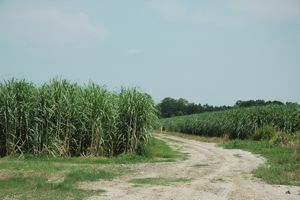
Ellender's sugar cane farm. (Photo: Steve Curwood)
[SIPPPING SOUNDS]
STEVE: Right here in the bayou, huh?
ELLENDER: [Laughs.] Right here in the BAYOU!
CURWOOD: And right here in the bayou, canals dredged by oil and gas companies have helped destroy the wetlands, leaving coastal residents more vulnerable to storms and flooding. And, how important is this to Theresa Marie Ellender?
ELLENDER: Coastal erosions are definitely a real thing. I mean, it’s really happening. Big ‘ol chunks of land are just falling off. That’s real important around here, because there’s not going to be here—
CURWOOD: (laughs) And, right here, I mean, really you’re in the sea. This house, this is elevated, you don’t have any kind of basement, I’m sure because….
ELLENDER: Oh, there’s no basement. But we’re high…. We are 8 feet above sea level. How bout that? Yeah, we’re pretty high, we’re kinda like the high point in the parish.
STEVE: But still… it must feel kind of tough being here. How many storms in how many years and now this oil spill?
ELLENDER: 5 years and 7 storms, it was pretty intense. And then…the oil spill, I mean, it’s been bad… it’s not clean and everything, but it’s not to the degree that it’s made out to be. I think that there’s a whole lot of environmentalist exaggeration going on. You know, if you start looking at some of the warm water catastrophes in oil, things clear up pretty quickly and pretty nicely.
CURWOOD: So, yeah, lets talk about this. We’ve had all these storms, this oil spill, what should- what could or can’t government do about this?
ELLENDER: The federal government needs just to kind of pull their hands off and allow the state just handle it. But people have got to learn to stop turning to the government, we’ve got to become self-reliant. And, with the moratorium, that thing has got to be completely overturned. Completely. Because, it’s hindering them, the oil companies, from doing their job. And I feel like I’m singing the praises of the oil companies, but you’ve got to understand…oil is the blood that runs through the whole country and without it there’s nothing. Makeup, oil. Everything, oil. Wish I had some on my property. (laughs).
CURWOOD: So, um. End of the day, how do you feel our democracy is working?
ELLENDER: Well, we have a Republic instead of a Democracy. And I don’t really feel like our republic is really working well. I don’t feel like the people in Washington are representing the people here. We need to get people of integrity, like Jeff Landry… up there.
CURWOOD: All three Republicans, and the lone Democrat, oppose President Obama’s moratorium on deep water drilling, but there’s still plenty to fight about. Republican oilfield manager Kristian Magar is polling in the single digits and is unlikely to survive past the first primary round on August 28th, which is open only to Republicans. It may take a runoff to settle the Republican contest and it’s already become a showdown about who’s the true conservative - Jeff Landry or former Louisiana House speaker and retired National Guard major general Hunt Downer.
[WALKING INTO DOWNER HEADQUARTERS, DOOR OPENS, BELL RINGS]
CURWOOD: Hunt Downers’s volunteers call themselves “Hunt’s Army,” and they work out of a bare-bones office building in downtown Houma, Louisiana.
[VOLUNTEERS MAKING NOISES, COPY MACHINE NOISES]
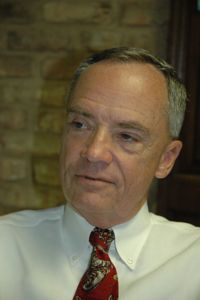
Republican candidate Major General Hunt Downer. (Photo: Steve Curwood)
CURWOOD: Huntington “Hunt” Downer served, not just in the first Gulf War, but also in Katrina and Rita, as the number two man in charge of the Louisiana National Guard’s rescue and rebuilding efforts, riding out Katrina at National Guard headquarters.
DOWNER: I actually saw my own vehicle float, go underwater, and then it just went from there, did search and rescue, spent the first week on a roof of the building, as we operated out of there for search and rescue in the new Orleans area, so I’m going up there as a general, to give them a little direction with some common sense and some practical knowledge learned at the hands of a hurricane, at the hands of a storm, having seeing coastal erosion…
CURWOOD: So you go to Capitol Hill—what would you change about the federal government that takes care of places like Louisiana that have a high flood danger?
DOWNER: The first thing I would do is reorganize the corps of engineers, get the bureaucrats out of it, get the bureaucracy out of it, and do like we do in the military…like you should… you make a decision and move forward. We don’t have time to study and study and study, I’m just tired of that. We need help down here. Look at the millions and billions we spent to save the Florida everglades, and that’s inland, we’re on the coast—save us! It’s a culture, it’s a way of life, it’s our oil and gas industry.
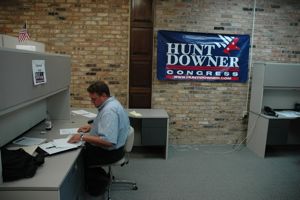
A volunteer at work at Hunt Downer headquarters in Houma, Louisiana. (Photo: Steve Curwood)
CURWOOD: Hunt Downer was a Democrat until about seven years ago when he switched parties. And like him, Democratic volunteer Carol Leblanc thinks the rest of the country needs to recognize southern Louisiana’s contributions, and vulnerabilities.
LEBLANC: What should government do? Money. Number one, foremost. If we get the proper resources, if we can get the proper monies down here we can build the proper levees, because we don’t have the proper levees, most places don’t. And if you don’t have the proper levees it’s just hopeless you know—what happened in New Orleans, you know. And I read of some of these senators and reps that don’t vote for funds for us and I’m like, I don’t understand that.
CURWOOD: This year Carol Leblanc’s fighting for Ravi Sangisetty, the sole Democratic candidate for the third district seat. Mr. Sangisetty also gets a helping hand from Craig Stewart, an attorney based in Houma, who has a different economic concern.
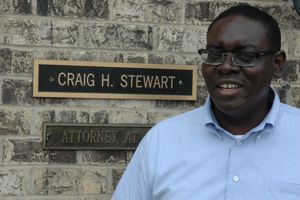
Houma attorney Craig Stewart supports Ravi Sangisetty. (Photo: Steve Curwood)
STEWART: Specifically Louisiana has been known or has historically been a community where the big companies would come in and pretty much have their way. So they’d come in waving the flag of we’ll bring 200, 3,000 jobs and then everyone would roll out the red carpet, forget the regulations, we’ll give you tax incentives to bring those jobs into our communities and we’ll turn our head when we have the environmental concerns. But you know with Ravi in there and a couple other individuals, maybe we can have a stronger voice at the table, a voice of reason that can put the checks and balances in place.
[RESTAURANT NOISES]
CURWOOD: Ravi Sangisetty is campaigning tonight at a local restaurant in the small town of Larose.
SANGISETTY: Thanks for coming out, how you doing, nice to meet you…
CURWOOD: About a dozen people get settled in plastic chairs at long tables, eyeing the candidate and the buffet of jambalaya spread out in the corner of the room.
[PEOPLE TALKING, LAUGHING]
CURWOOD: Ravi Sangisetty’s a Princeton-educated attorney who wrote his senior thesis on how to save a local estuary. At just 27, he’s a lot younger than people he stands up to address. He also stands out for another reason here in Cajun country—his parents were born in India.
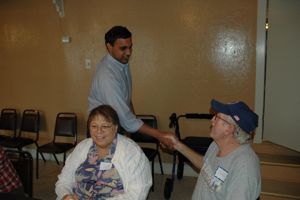
Democrat Ravi Sangisetty introduces himself to potential voters in Larose, Louisiana. (Photo: Steve Curwood)
SANGISETTY: Hey ya’ll thank you so much for coming, My name is Ravi Sangisetty. I was raised right here in south Louisiana, and as I’m sure I’ll challenged on that fact I’ll be sure to carry my birth certificate with me as I hit the trail (laughter).
We’re well acquainted with federal government dysfunction here in south Louisiana. Well it’s time for south Louisiana to take a stand! We produce energy, seafood, agricultural goods like sugar cane, and we build ships for the rest of the country. And we do this despite the fact that we’re washing away, that we’re losing our coast, that we lack adequate hurricane protection.
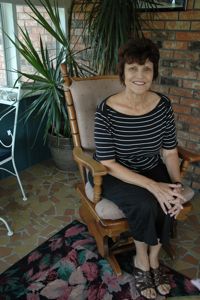
Carol Leblanc, born and raised in the bayou, helps connect her candidate, Democrat Ravi Sangisetty with the community and potential voters. (Photo: Steve Curwood)
CURWOOD: Ravi Sangisetti is there to talk—and listen. And before he can secure votes, he has to win some credibility.
Man: Why should we believe you?! But that’s the attitude I have though… I know what you talking about, in other words what you saying is you need to get in there to change it—but will you change it?
SANGISETTY: Absolutely
MAN: We been cheated so much, so many lies, and everything…the way things going right now, in other words I’m frustrated and I had enough of it, now I feel sorry for my grandkids, I feel sorry for my kids, I been a fisherman for almost all my life, it’s a way of life and everything else, that’s how I was raised with my daddy. We lost it—our freedom is gone.
CURWOOD: In November Ravi Sangisetty will face the Republican who eventually gets more than 51 percent of the GOP vote. Perhaps then the Bayou country electorate will make it clear what the majority wants in addition to integrity: less government or more federal money. Our piece on Louisiana politics was produced by Mitra Taj.
UPDATE: After the votes in the Republican Primary of August 28 were counted Hunt Downer received 7,570 votes or 36.1%, Jeff Landry 10,396 votes or 49.6%, and Kristian Magar 2,987 votes or 14.3 % out of a total of 20,953 ballots tallied. Jeff Landry and Hunt Downer, the top two vote getters ,will face off in another voting round on Oct 2, the same day as municipal elections in the area and voter turnout is expected to be higher. Had Mr. Landy received just 81 more votes on August 28, he would have had an outright majority and won the Republican nomination for Louisiana’s third district Congressional seat.
Links
Living on Earth wants to hear from you!
Living on Earth
62 Calef Highway, Suite 212
Lee, NH 03861
Telephone: 617-287-4121
E-mail: comments@loe.org
Newsletter [Click here]
Donate to Living on Earth!
Living on Earth is an independent media program and relies entirely on contributions from listeners and institutions supporting public service. Please donate now to preserve an independent environmental voice.
NewsletterLiving on Earth offers a weekly delivery of the show's rundown to your mailbox. Sign up for our newsletter today!
 Sailors For The Sea: Be the change you want to sea.
Sailors For The Sea: Be the change you want to sea.
 The Grantham Foundation for the Protection of the Environment: Committed to protecting and improving the health of the global environment.
The Grantham Foundation for the Protection of the Environment: Committed to protecting and improving the health of the global environment.
 Contribute to Living on Earth and receive, as our gift to you, an archival print of one of Mark Seth Lender's extraordinary wildlife photographs. Follow the link to see Mark's current collection of photographs.
Contribute to Living on Earth and receive, as our gift to you, an archival print of one of Mark Seth Lender's extraordinary wildlife photographs. Follow the link to see Mark's current collection of photographs.
 Buy a signed copy of Mark Seth Lender's book Smeagull the Seagull & support Living on Earth
Buy a signed copy of Mark Seth Lender's book Smeagull the Seagull & support Living on Earth

